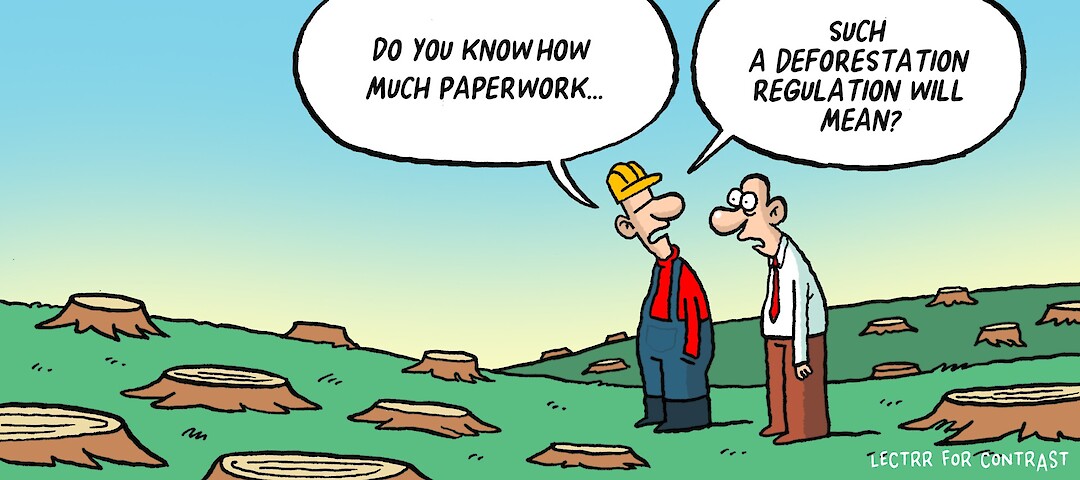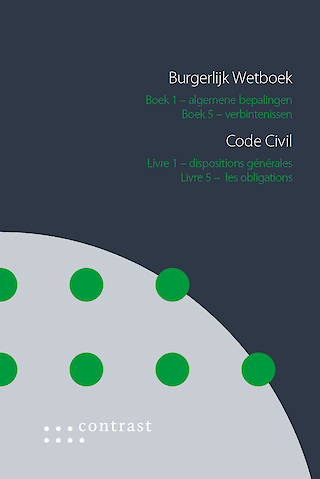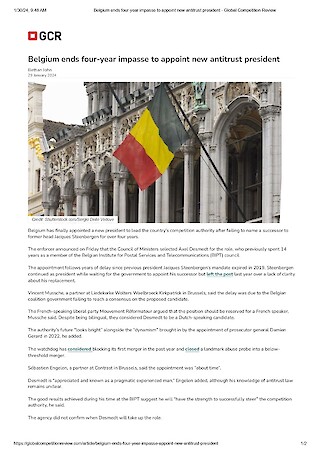In the Picture

Finding the forest through the trees of the Deforestation Regulation
April 2024Imagine…
You are a chocolatier, an industrial butcher or joinery, or a garage owner. At a meeting of your trade association, you hear that soon you will have to comply with a Deforestation Regulation.
You are flabbergasted. You understand that there is a Deforestation Regulation, but what could such a regulation have to say about the sale of your products? This can't be right, can it?
A brief clarification.
The main cause of deforestation is the expansion of agricultural land to produce commodities such as cocoa, coffee or wood. The EU is a major consumer of products based on these commodities. Yet at EU level, specific rules to reduce the EU's impact on deforestation and forest degradation were limited. Until now.
As one of the tools for achieving the Green Deal, the EU adopted a regulation on 9 June 2023 that specifically aims to combat deforestation and forest degradation.
This Deforestation Regulation provides that certain commodities and the products made from them (so-called "relevant commodities" and "relevant products") may not be sold in the EU unless they meet certain conditions. This is also the case for exports from the EU of these relevant commodities and products.
The relevant commodities are cattle, cocoa, coffee, oil palm, rubber, soya and wood. The list of relevant products is longer. For our examples above, the list includes cocoa paste, chocolate, meat of cattle, wooden furniture and rubber tyres.
The conditions for sale or export are threefold: the relevant commodities and products (i) must not have caused deforestation after 31 December 2020, (ii) must have been produced in accordance with the relevant legislation of the country of production and (iii) must be covered by a due diligence statement.
The laws in the producing country are not only forest-related rules, but also concern land-use rights, environmental protection, labour rights, human rights, and tax and anti-corruption regulations. The Deforestation Regulation thus deals with much more than just deforestation.
The due diligence requirements imposed by the regulation apply to all operators and traders selling or exporting the relevant commodities and products. They must conduct due diligence and be able to trace the relevant commodities and products back to the piece of land where they were produced. On this basis, they must upload a due diligence declaration to the information system that the Commission will set up. By doing so, they assume responsibility that the conditions are met.
Checks for compliance with the Deforestation Regulation are made by national authorities according to a given country's risk level (low, standard or high). Higher-risk countries are checked more strictly: competent authorities must carry out checks on 9 per cent of operators and traders trading products from high-risk countries and only 1 per cent from low-risk countries.
The regulation provides that EU Member States must be able to require corrective action, for example to withdraw non-compliant products from the market. Similarly, customs authorities must be able to stop imports and exports of non-compliant products.
In addition, EU Member States must ensure that their competent authorities can impose effective, proportionate and dissuasive penalties. Fines must be proportionate to the environmental damage caused and to the value of the commodities and products concerned. Maximum fines must be at least 4 per cent of the annual EU turnover of the operator or trader concerned. Possible penalties also include temporary exclusion from public tenders and access to public funding.
Individuals and environmental organisations have the right to enforce the ban on the sale or export of non-compliant products through the courts and to claim damages.
Concretely.
- The Deforestation Regulation prohibits the sale in the EU and export from the EU of certain commodities and products unless they are deforestation-free, are produced according to the laws of the country of production and meet due diligence requirements.
- The relevant commodities are those associated with deforestation and forest degradation, such as cattle, cocoa, coffee, oil palm, rubber, soya and wood. The relevant products made from the commodities are listed in the annex to the regulation. Only relevant commodities and products produced after 29 June 2023 fall within the scope of the regulation.
- The due diligence requirements concern a due diligence statement that operators and traders must upload for each transaction, by which they assume responsibility for the compliance with the Deforestation Regulation.
- The competent authorities of the EU Member States must carry out checks and can require far-reaching corrective action and impose sanctions in case of infringements, including fines of up to at least 4 per cent of the annual EU turnover of the operator or trader concerned.
- Large companies will be subject to the various obligations as of the end of 2024, and SMEs as of 30 June 2025. The latter will have to comply with more limited formalities. For example, they will not have to conduct due diligence if a direct or indirect supplier has already done so.
Want to know more?
Please consult our website or contact one of our team members if you have questions or require more information:












